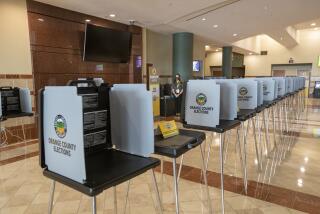The money trap
- Share via
There are good reasons for most of the city’s campaign finance laws. Individual contribution limits are intended to keep a single donor from purchasing the support of a candidate. Public financing is intended to level the playing field between incumbents and challengers. Limits on gifts help deter graft.
But Los Angeles has one regulation that doesn’t show up in many other places, and it doesn’t make much sense: Candidates who raise money for an election cannot carry that money over if they fail to win in the first round and face a runoff for the same office. What that’s meant in this election cycle is that both Councilman Eric Garcetti and Controller Wendy Greuel, who spent years raising money for the first round of the campaign for mayor, had to start all over when they made the runoff.
Because of the law, at the very moment a mayoral campaign gets serious and voters tune in, candidates have to return to the unpleasant business of begging for money. Immediately after winning the first round in the mayor’s race, for instance, Garcetti darted off to Washington for fundraisers. And Greuel turned to stalwart supporters to post 82 donations in 72 hours, all at the maximum amount of $1,300 -- for a total of $106,000.
Why does Los Angeles force candidates into a frenzy of second-round fundraising? The regulation dates to 1990 statutes that created the city’s Ethics Commission and the rules it enforces. Those rules set out different kinds of elections, including “a primary nominating election, a general municipal election, a special election and a recall election.” Each of those elections is defined as a separate contest, so contribution and expenditure limits apply separately to the first round and the runoff.
There is good reason to treat some elections separately. Imagine the candidate who raises money to run for City Council, say, and then decides instead to run for mayor. A donor who supported the candidate for a council seat might be supporting someone else for mayor, and might legitimately object to his money being spent on a different race.
In 2002, Assemblyman Rod Wright set out to run for the City Council’s 8th District, and began raising money to do so. He then switched gears and decided to run for the 10th District, so he asked the city’s Ethics Commission whether he could shift the money he had raised. The commission’s answer: No. Contributions, it said in a formal opinion, “may be expended only in connection with the candidacy for the office specified.”
That makes sense, but would a donor who gave to Greuel or Garcetti last year really object to that money being spent in May rather than February?
Meantime, it forces candidates to dwell on money at precisely the same moment that voters are eager for them to focus on issues.
“It’s incredibly bothersome,” said Bill Carrick, the campaign consultant working with Garcetti in this race. Carrick runs campaigns across the country, and he says Los Angeles is the only place he knows of with such a rule.
The prohibition against holding on to money for the runoff is not the only problem with the city’s campaign finance regulations, but most of the others are because of constitutional issues. The proliferation of independent expenditure committees, for instance, undermines the purpose of contribution limits because moneyed interests can form committees to raise and spend unlimited amounts on behalf of candidates, even as individual contributions are capped.
That, of course, is precisely what’s happened in this race. Both candidates have benefited from independent expenditures, but far more outside money has been spent to promote Greuel than Garcetti. (As of Friday, about $1.8 million in independent expenditures had been spent on Garcetti’s behalf, compared with about $4 million on Greuel’s.)
Meanwhile, both sides have also rushed to raise money for the runoff. Garcetti has been significantly more successful: He’s raised almost $3 million since the March elections and has spent just $1.5 million, leaving him with ample cash for the final days. Greuel’s treasury, by contrast, has spent almost $1 million more than it has raised from donors ($800,000 in matching funds have almost made up the difference). She has lent herself $100,000.
At the end of every campaign, there is an opportunity to reflect on what worked and what didn’t in the area of campaign finance. This time, that conversation should start with a push by the winner to amend the city’s prohibition on carrying cash forward in a runoff. That wouldn’t eliminate all the problems with money in city campaigns, but it might take care of one.
--
More to Read
Get the L.A. Times Politics newsletter
Deeply reported insights into legislation, politics and policy from Sacramento, Washington and beyond. In your inbox twice per week.
You may occasionally receive promotional content from the Los Angeles Times.











